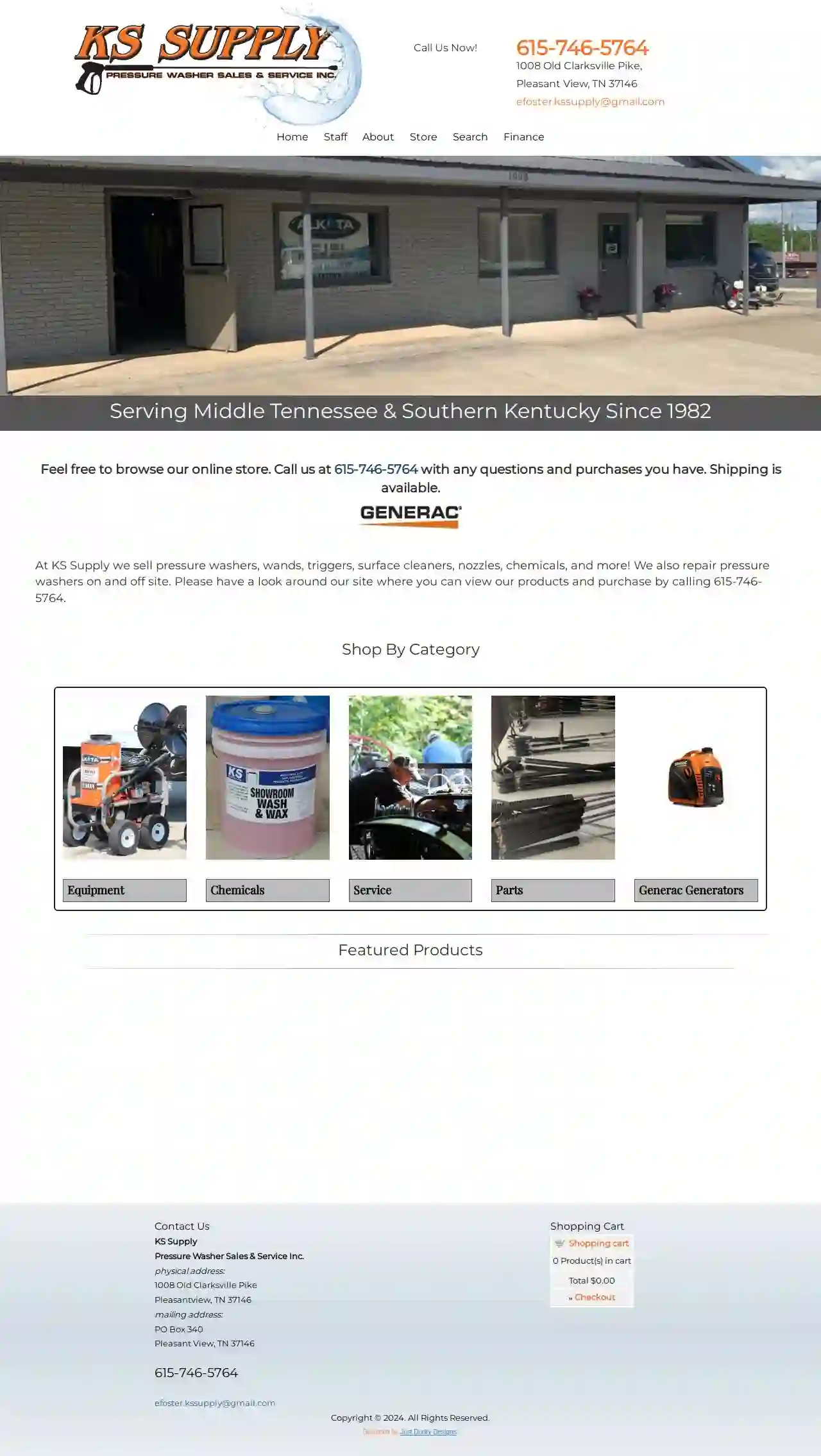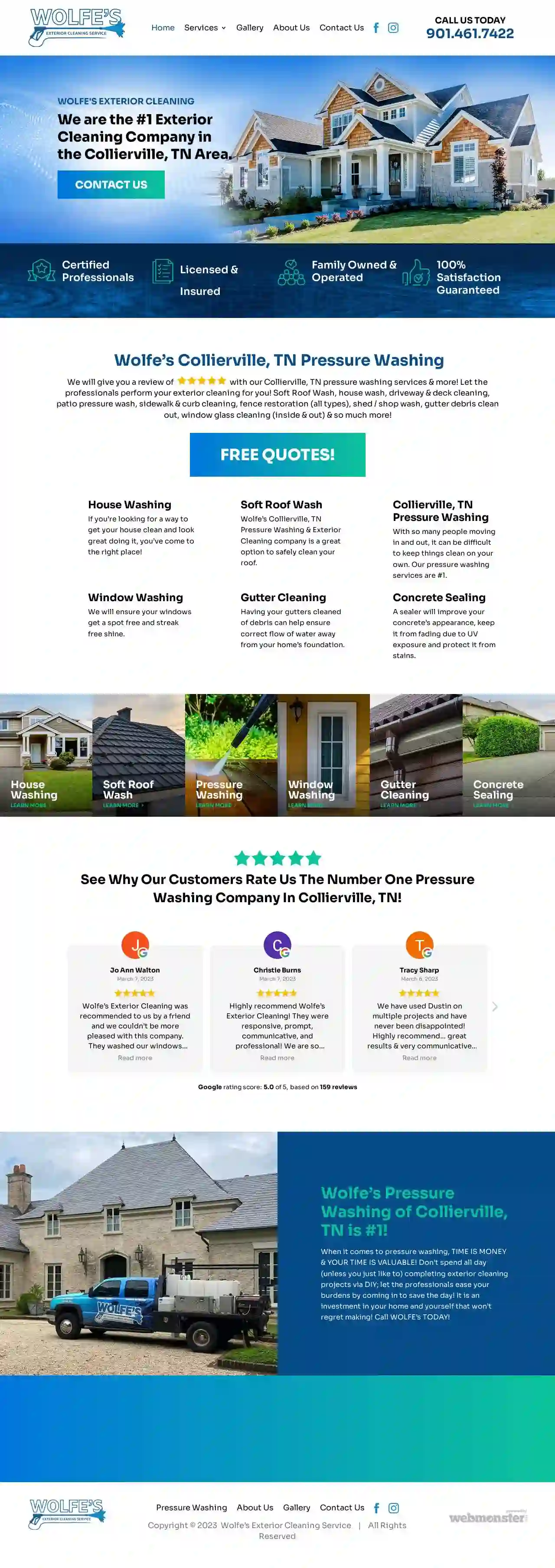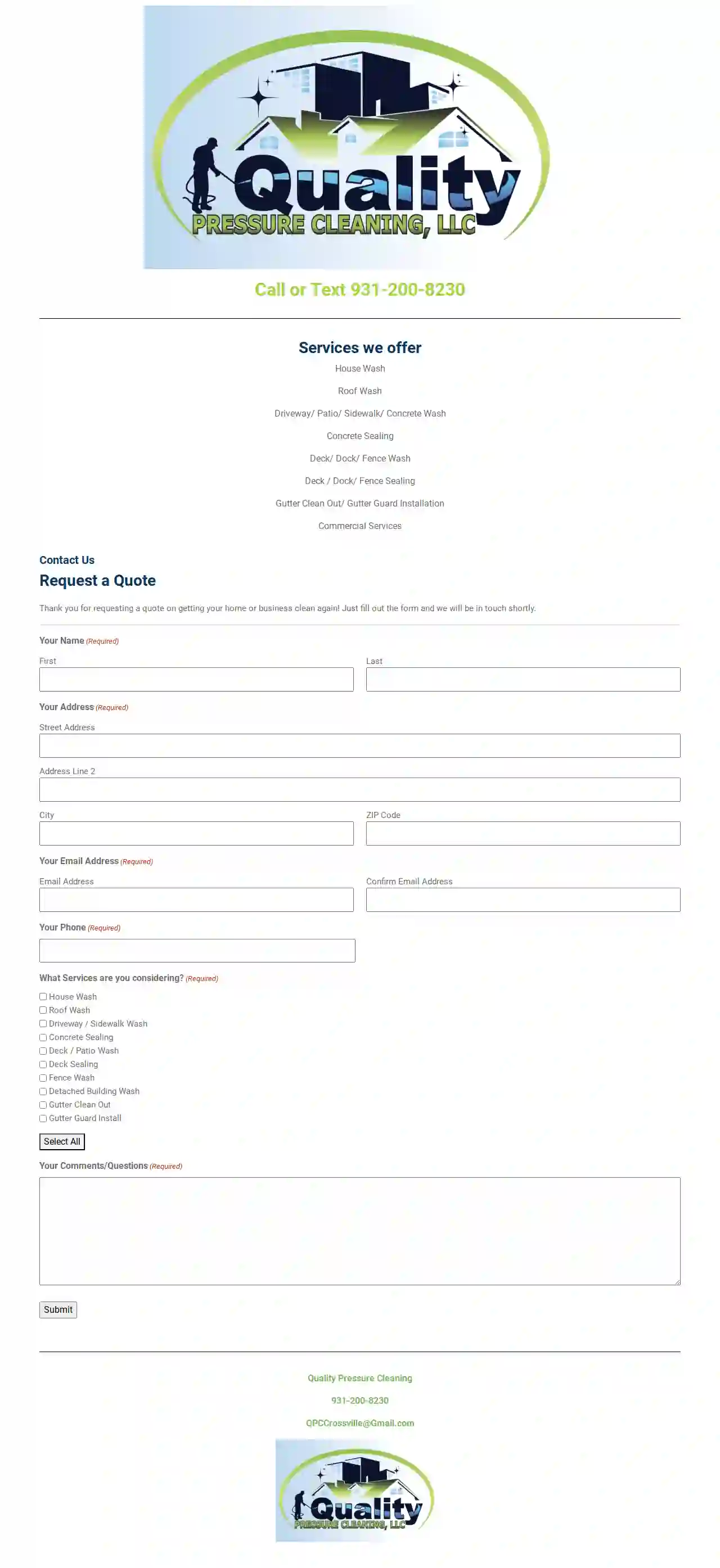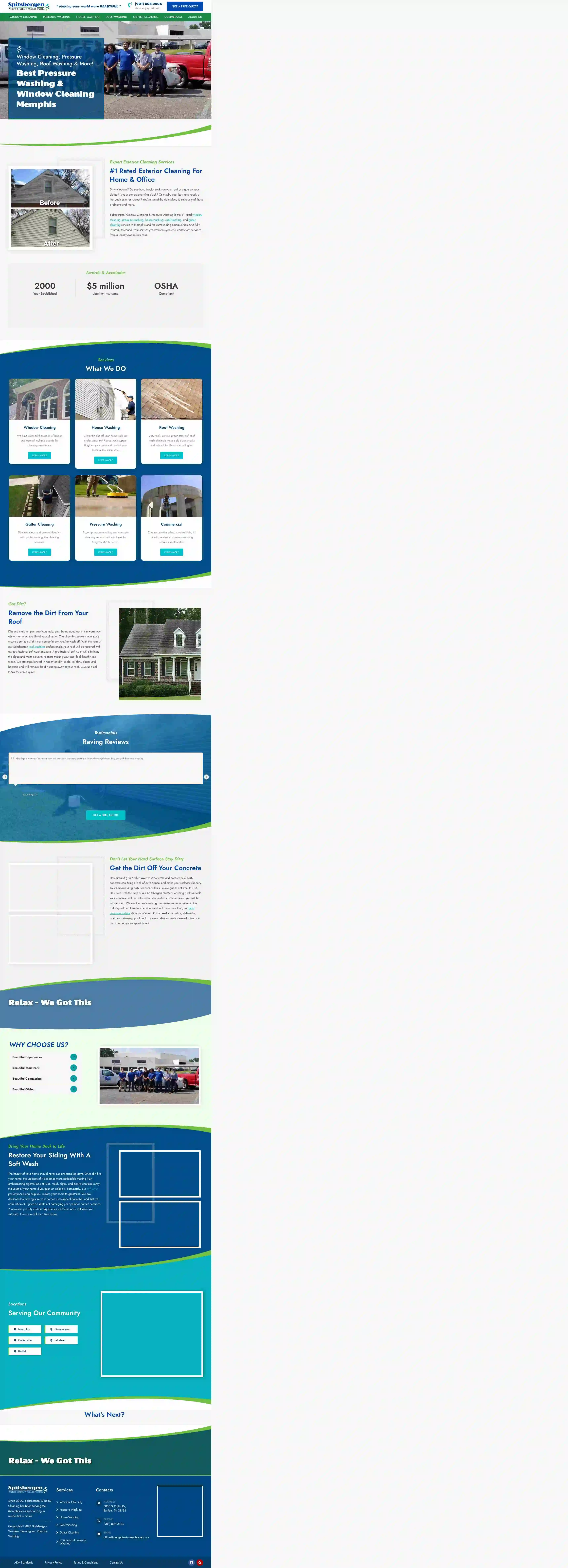Pressure Washing Jefferson City
Find top Commercial Pressure Washing in Jefferson City
Get multiple Pressure Washing quotes for your project today! Compare profiles, reviews, accreditations, portfolio, etc... and choose the best service.

Devins Powerwash
5101 reviews661 Front St Suite 10, Berea, 44017, USDevins Powerwash is your trusted partner for all your pressure washing needs in Cleveland, Ohio. We offer a wide range of residential and commercial pressure washing services, including house washing, roof cleaning, gutter cleaning, driveway cleaning, fence cleaning, deck cleaning, concrete sealing, driveway sealing, building washing, storefront cleaning, drive-through cleaning, parking lot and garage cleaning, apartment complex pressure washing, dumpster pad cleaning, awning cleaning, gas station cleaning, fleet washing, and HOA pressure washing. Our team of experienced and certified professionals uses the latest equipment and techniques to deliver exceptional results. We are committed to providing our clients with high-quality, reliable, and affordable pressure washing services. Contact us today for a free estimate!
- Services
- Why Us?
- Accreditations
- Our Team
- Testimonials
- Gallery
Get Quote
Leon's Pressure Washing
553 reviewsMurfreesboro, USLeon's Pressure Washing is the premier choice for top-notch exterior cleaning services in Middle Tennessee. We specialize in House Washing, Roof Cleaning, Driveway Washing, Fence and Deck Cleaning, Gutter Cleanout, Window Cleaning, and Driveway Sealing. Our skilled team, led by founder Jesse Leon, ensures your property shines with a blend of expertise and care. We bring life back to your surroundings. With expert House Washing, Roof Cleaning, and a range of exterior cleaning services, we rejuvenate your property's appearance.
- Services
- Why Us?
- Gallery
Get Quote
Pristine Power Clean
51 reviews4515 Shamus Way, Knoxville, TN, 37918, USPristine Power Clean is a specialized power washing enterprise in Knoxville, founded by Brent Osburn with a passion for cleanliness. We provide the best power washing in Knoxville and treat every property with the utmost respect and attention to detail. Our power washing company prides itself on being the best choice for residential and commercial properties since we tailor our services to suit your exact needs and desired tastes.
- Services
- Why Us?
- Accreditations
- Our Team
- Testimonials
- Gallery
Get Quote
LJ Power Washing Services
542 reviews123 Main St, Clarksville, TN, 37040, USLJ Power Washing Services is a locally owned and operated business in Clarksville, Tennessee, providing residential and commercial power washing services. With over a decade of experience, they offer competitive rates and unbeatable customer service. Their services include pressure washing, soft washing, wood staining, concrete sealing, and roof cleaning. They guarantee customer satisfaction on all work and have a reputation for quality equipment and expertise.
- Services
- Why Us?
- Accreditations
- Our Team
- Testimonials
- Gallery
Get Quote
KS Supply Pressure Washer Sales and Service Inc.
566 reviews1008 Old Clarksville Pike, Pleasantview, 37146, USServing Middle Tennessee & Southern Kentucky Since 1982. At KS Supply we sell pressure washers, wands, triggers, surface cleaners, nozzles, chemicals, and more! We also repair pressure washers on and off site. Please have a look around our site where you can view our products and purchase by calling 615-746-5764.
- Services
- Why Us?
- Our Team
- Gallery
Get Quote
Wolfe's Pressure Washing & Exterior Cleaning
5225 reviewsCollierville, TN, N/A, 38017, USWolfe's Exterior Cleaning Service is a family-owned and operated business that offers a variety of exterior cleaning services including house washing, soft roof washing, pressure washing, window washing, gutter cleaning, and concrete sealing. They are certified professionals, licensed and insured, and guarantee 100% satisfaction. Their team is dedicated to providing excellent service and ensuring customer satisfaction.
- Services
- Why Us?
- Accreditations
- Our Team
- Testimonials
- Gallery
Get Quote
Quality Pressure Cleaning, LLC
5125 reviews1000 S Willow Ave, Cookeville, 38501, USTennessee Pressure Washing is your local source for professional pressure washing services in the Cookeville, TN area. We offer a wide range of services to meet your needs, including house washing, roof washing, driveway and sidewalk washing, concrete sealing, deck and fence washing, gutter cleaning, and more. We are fully insured and bonded, and we use only the highest quality equipment and products. Our team of experienced professionals is dedicated to providing you with the best possible service. Contact us today for a free estimate!
- Services
- Why Us?
- Gallery
Get Quote
Spitsbergen Window Cleaning and Pressure Washing
5169 reviewsMemphis, USMaking your world more BEAUTIFUL. Spitsbergen Window Cleaning and Pressure Washing is the #1 rated window cleaning, pressure washing, house washing, roof washing, and gutter cleaning service in Memphis and the surrounding communities. Our fully insured, screened, safe service professionals provide world-class services from a locally-owned business. We have cleaned thousands of homes and earned multiple awards for cleaning excellence. Our proprietary soft house wash system, soft roof wash, and gutter cleaning services will eliminate the toughest dirt & debris. Choose only the safest, most reliable, #1 rated commercial pressure washing services in Memphis.
- Services
- Why Us?
- Accreditations
- Testimonials
- Gallery
Get Quote
East Hill Pressure Washing
530 reviews3102 Keeling Avenue, Nashville, 37216, USLocally owned in historic and HIP East Nashville, East Hill Pressure Washing is your professional and affordable exterior cleaning service. Licensed and insured, we offer residential and commercial services. Using bio-degradable detergent solutions, we employ a safe and sanitary SOFT WASHING technique to remove harmful contaminants and ensure a #healthyhome every time. We service the entire middle Tennessee area and always offer a 10% discount for stateside/retired military. Call or text today for your FREE estimate and get on our schedule to enjoy a nice, clean, healthy environment for your home or business.
- Services
- Why Us?
- Our Team
- Gallery
Get Quote
Allegiance Pressure Washing
5197 reviews123 Main St, Suite 100, Nashville, 37201, USAllegiance Pressure Washing is proud to provide homeowners and property managers in the Nashville, Franklin, Brentwood, Dickson, Gallatin and Murfreesboro areas with a complete range of pressure washing, power washing, window washing, vinyl siding cleaning, exterior cleaning and restoration services to meet your needs & your budget. We pledge to deliver excellent service, and an unmatched level of workmanship on each and every job we perform, which is why we come strongly recommended by our Nashville clients. Your 100% satisfaction in every phase of our work is extremely important to us. Proper equipment & years of professional experience in the pressure washing and exterior cleaning industries make us the right choice to clean your home or multi-unit property. So why waste one more day with a dirty or dull exterior that doesn’t make you happy? We can help!
- Services
- Why Us?
- Accreditations
- Our Team
- Testimonials
- Gallery
Get Quote
Over 60,241+ Cleaning Services on our platform
Our janitorial pros operate in Jefferson City & beyond!
CleaningMatch has curated and vetted Top Janitorial Contractors near Jefferson City. Find the most trustworthy business today.
Frequently Asked Questions About Pressure Washing
- Pressure Washing: If your siding is in good condition but dirty or stained, pressure washing can effectively restore its appearance without the need for painting.
- Painting: If your siding is faded, chipped, peeling, or damaged, pressure washing alone may not be sufficient. Painting provides a fresh coat of protection and a new look.
- Pressure Washing Before Painting: Pressure washing is an essential step before painting, as it removes dirt, grime, and loose paint, creating a clean surface for the new paint to adhere to.
- Online Reviews: Check online reviews on platforms like Google, Yelp, and Facebook to gauge customer satisfaction and service quality.
- Experience and Expertise: Look for companies with a proven track record and experience in pressure washing various surfaces.
- Licensing and Insurance: Ensure the company is licensed and insured to protect you from liability in case of accidents or damage.
- Equipment and Techniques: Inquire about the company's equipment and techniques to ensure they use appropriate pressure levels and cleaning solutions for different surfaces.
- Quotes and Pricing: Obtain detailed quotes from multiple pressure washing companies and compare their pricing. Make sure the quotes are transparent, outlining all services and costs.
- Professionalism and Communication: Choose a company that is responsive, provides clear communication, and demonstrates professionalism in its interactions.
- Cover or Shield Plants: Before pressure washing, cover or shield delicate plants and landscaping with tarps, plastic sheeting, or painter's tape to protect them from water spray and chemicals.
- Use Lower Pressure Settings: If pressure washing near plants, use lower pressure settings and avoid directing the spray directly at them.
- Rinse Plants with Water: After pressure washing, rinse plants thoroughly with plain water to dilute any chemicals that may have landed on them.
- Choose Plant-Safe Cleaning Solutions: If using cleaning solutions, opt for environmentally friendly or plant-safe options whenever possible.
- Reputation and Reviews: Check online reviews and ask for referrals to gauge the company's reputation and customer satisfaction.
- Experience and Expertise: Look for a company with a proven track record and experience in pressure washing various surfaces.
- Licensing and Insurance: Ensure the company is licensed and insured to protect you from liability.
- Equipment and Techniques: Inquire about the company's equipment and techniques to ensure they use appropriate pressure levels and cleaning solutions.
- Quotes and Pricing: Obtain detailed quotes that outline all services and costs.
- Professionalism and Communication: Choose a company that is responsive, communicative, and professional.
Is it better to pressure wash or paint my house?
Assess the condition of your siding and your desired outcome to determine whether pressure washing, painting, or a combination of both is the best approach.
How do I find a good pressure washing service?
Utilize online directories like CleaningMatch to find and compare qualified pressure washing services in your area.
Can pressure washing damage my plants?
Taking these precautions minimizes the risk of damage to your plants and landscaping during pressure washing.
What should I look for in a pressure washing company?
A reputable pressure washing company will prioritize safety, use appropriate cleaning methods, and provide excellent customer service.
Is it better to pressure wash or paint my house?
- Pressure Washing: If your siding is in good condition but dirty or stained, pressure washing can effectively restore its appearance without the need for painting.
- Painting: If your siding is faded, chipped, peeling, or damaged, pressure washing alone may not be sufficient. Painting provides a fresh coat of protection and a new look.
- Pressure Washing Before Painting: Pressure washing is an essential step before painting, as it removes dirt, grime, and loose paint, creating a clean surface for the new paint to adhere to.
Assess the condition of your siding and your desired outcome to determine whether pressure washing, painting, or a combination of both is the best approach.
How do I find a good pressure washing service?
- Online Reviews: Check online reviews on platforms like Google, Yelp, and Facebook to gauge customer satisfaction and service quality.
- Experience and Expertise: Look for companies with a proven track record and experience in pressure washing various surfaces.
- Licensing and Insurance: Ensure the company is licensed and insured to protect you from liability in case of accidents or damage.
- Equipment and Techniques: Inquire about the company's equipment and techniques to ensure they use appropriate pressure levels and cleaning solutions for different surfaces.
- Quotes and Pricing: Obtain detailed quotes from multiple pressure washing companies and compare their pricing. Make sure the quotes are transparent, outlining all services and costs.
- Professionalism and Communication: Choose a company that is responsive, provides clear communication, and demonstrates professionalism in its interactions.
Utilize online directories like CleaningMatch to find and compare qualified pressure washing services in your area.
Can pressure washing damage my plants?
- Cover or Shield Plants: Before pressure washing, cover or shield delicate plants and landscaping with tarps, plastic sheeting, or painter's tape to protect them from water spray and chemicals.
- Use Lower Pressure Settings: If pressure washing near plants, use lower pressure settings and avoid directing the spray directly at them.
- Rinse Plants with Water: After pressure washing, rinse plants thoroughly with plain water to dilute any chemicals that may have landed on them.
- Choose Plant-Safe Cleaning Solutions: If using cleaning solutions, opt for environmentally friendly or plant-safe options whenever possible.
Taking these precautions minimizes the risk of damage to your plants and landscaping during pressure washing.
What should I look for in a pressure washing company?
- Reputation and Reviews: Check online reviews and ask for referrals to gauge the company's reputation and customer satisfaction.
- Experience and Expertise: Look for a company with a proven track record and experience in pressure washing various surfaces.
- Licensing and Insurance: Ensure the company is licensed and insured to protect you from liability.
- Equipment and Techniques: Inquire about the company's equipment and techniques to ensure they use appropriate pressure levels and cleaning solutions.
- Quotes and Pricing: Obtain detailed quotes that outline all services and costs.
- Professionalism and Communication: Choose a company that is responsive, communicative, and professional.
A reputable pressure washing company will prioritize safety, use appropriate cleaning methods, and provide excellent customer service.